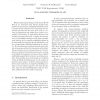Free Online Productivity Tools
i2Speak
i2Symbol
i2OCR
iTex2Img
iWeb2Print
iWeb2Shot
i2Type
iPdf2Split
iPdf2Merge
i2Bopomofo
i2Arabic
i2Style
i2Image
i2PDF
iLatex2Rtf
Sci2ools
FOCS
2003
IEEE
2003
IEEE
Always Good Turing: Asymptotically Optimal Probability Estimation
While deciphering the Enigma Code during World War II, I.J. Good and A.M. Turing considered the problem of estimating a probability distribution from a sample of data. They derived a surprising and unintuitive formula that has since been used in a variety of applications and studied by a number of researchers. Borrowing an information-theoretic and machine-learning framework, we define the attenuation of a probability estimator as the largest possible ratio between the per-symbol probability assigned to an arbitrarily-long sequence by any distribution, and the corresponding probability assigned by the estimator. We show that some common estimators have infinite attenuation and that the attenuation of the GoodTuring estimator is low, yet larger than one. We then derive an estimator whose attenuation is one, namely, as the length of any sequence increases, the per-symbol probability assigned by the estimator is as high as possible. Interestingly, some of the proofs use celebrated resu...
| Added | 04 Jul 2010 |
| Updated | 04 Jul 2010 |
| Type | Conference |
| Year | 2003 |
| Where | FOCS |
| Authors | Alon Orlitsky, Narayana P. Santhanam, Junan Zhang |
Comments (0)

